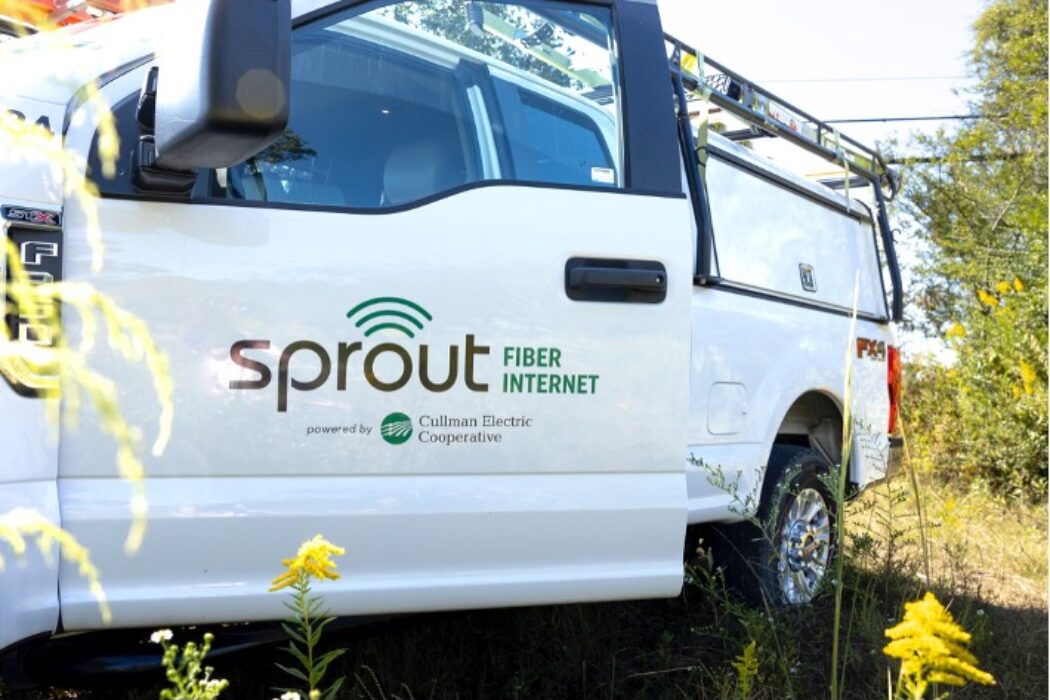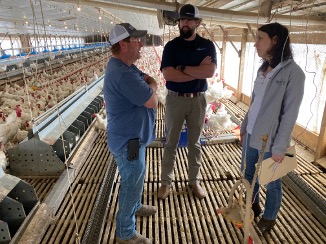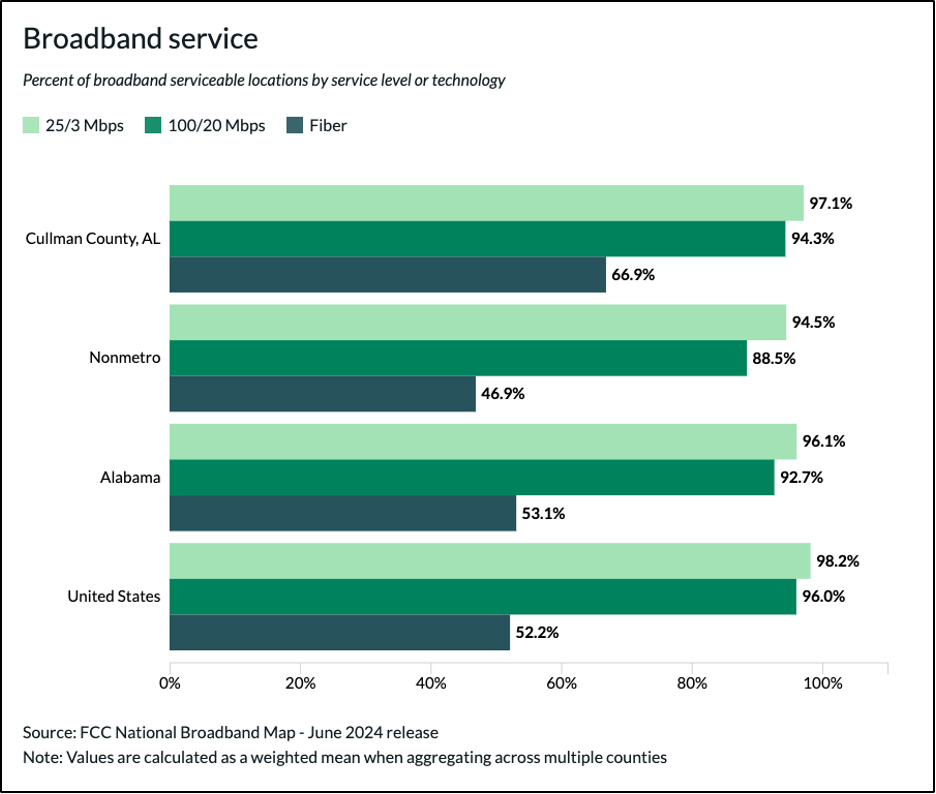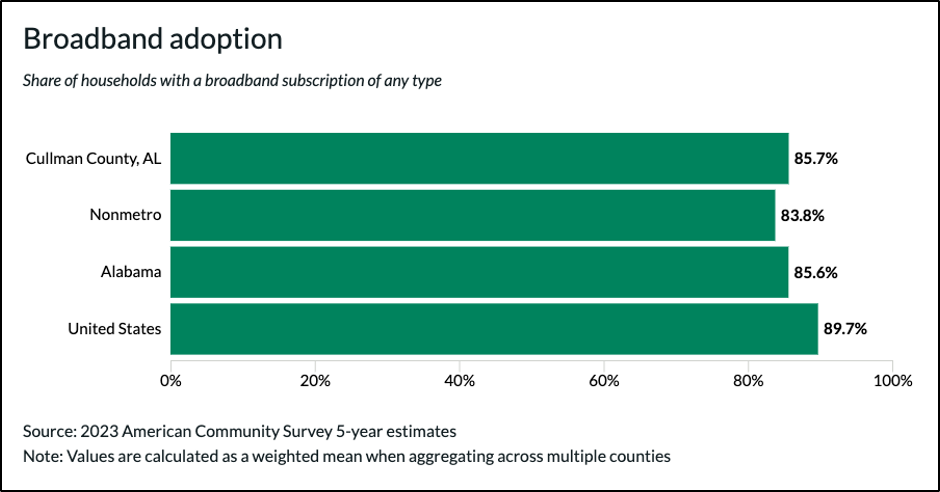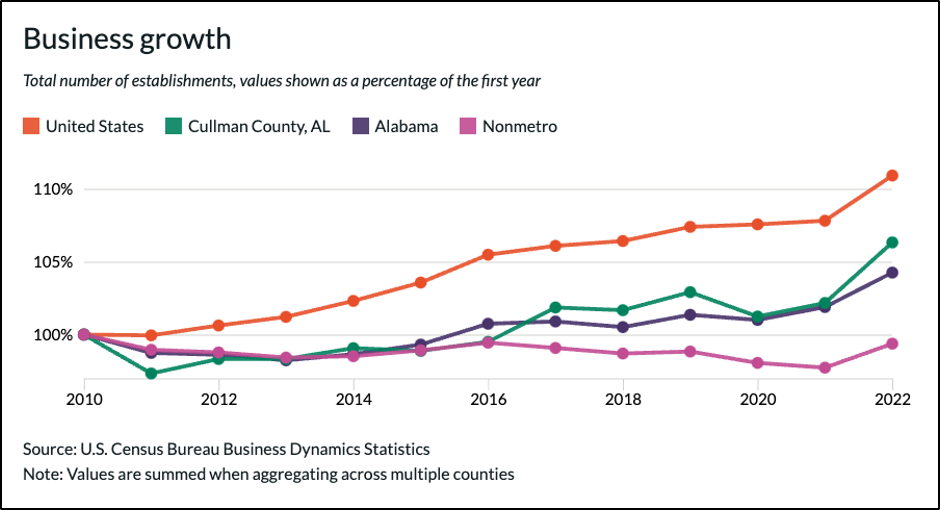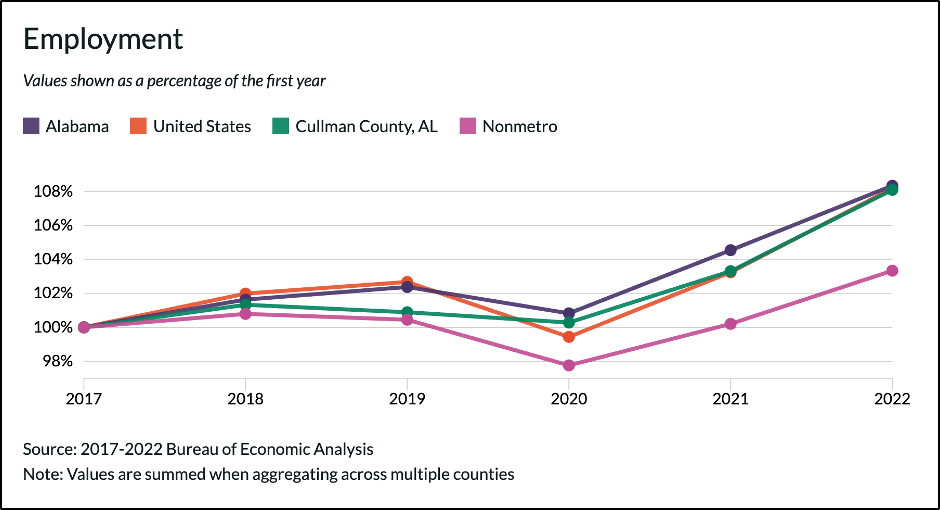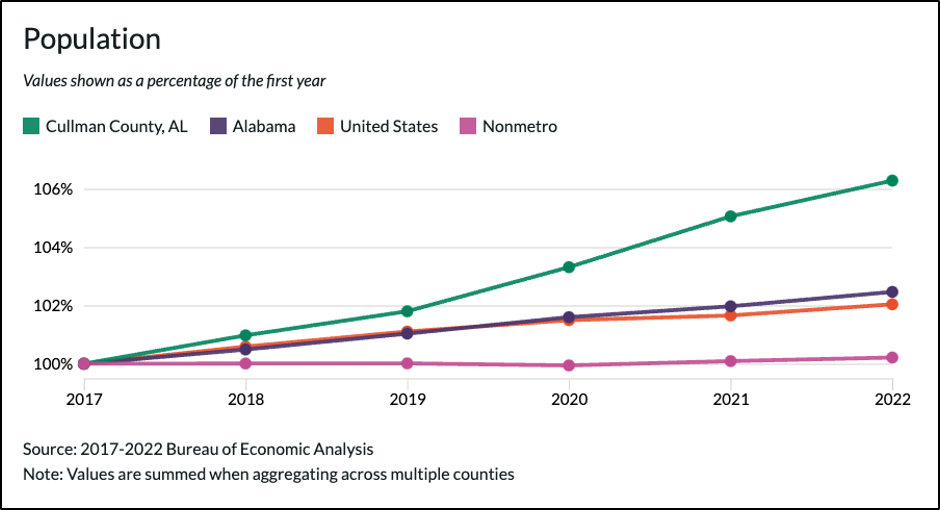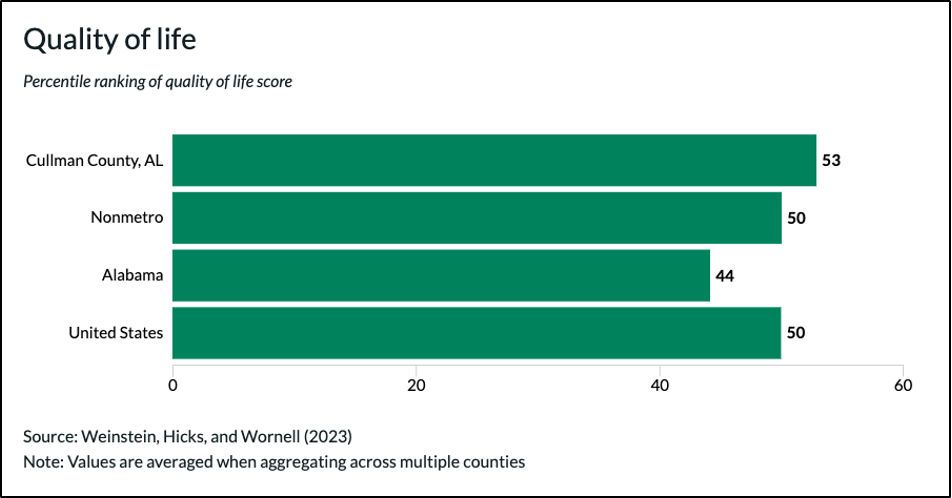Beyond Connectivity case study: Cullman County, Alabama
Cullman County, Alabama, is a fast-growing community conveniently located between two of the state’s largest cities: Huntsville and Birmingham. Like many rural areas, it has historically had limited access to high-speed broadband. That changed with
Cullman County, Alabama, is a fast-growing community conveniently located between two of the state’s largest cities: Huntsville and Birmingham.
Like many rural areas, it has historically had limited access to high-speed broadband. That changed with the launch of Sprout Fiber Internet, a broadband initiative from Cullman Electric Cooperative that is bringing world-class fiber throughout its electric footprint.
Cullman has long been home to traditional rural industries like agriculture and manufacturing. With the deployment of great fiber broadband by Sprout, the region is seeing continued interest from major manufacturing companies in growing their footprint in the county. However, a new trend has also emerged: the county is seeing an increase in new home-grown ideas and entrepreneurs starting new businesses.
Necessity is the mother of invention today, as it was when Cullman Electric started.
Before Sprout Fiber Internet launched in 2020, Cullman County businesses and residents had few options for high-speed internet. Though high-speed broadband had become necessary for modern agriculture and manufacturing operations, not to mention for small businesses and entrepreneurs, many areas had speeds below the Federal Communication Commission’s (FCC) broadband threshold. Slow internet connectivity hinders economic growth, remote work opportunities, and access to essential services like telehealth and online education.
Dale Greer, Director of the Cullman Economic Development Agency, described broadband access as a key constraint to local economic development: “We’ve grown significantly, but the fiber was the holdup for us that we just didn’t have. I always said that you could conduct business anywhere if you had the right telecommunications capabilities.”
In response to the urgent need for broadband, Cullman Electric Cooperative launched Sprout Fiber Internet in 2020, connecting its first subscribers in early 2021. Fiber provides the fast, reliable connectivity that communities need to grow their economies, support local businesses, and expand access to essential services.
This initiative follows Cullman Electric’s long-standing commitment to serving rural areas, much like its original efforts to electrify the region in the 1930s. In fact, the name Sprout pays homage to the 14 farmers who spearheaded the electrification movement in the county after they were denied access to electricity, forming the cooperative and becoming its first board of directors.
Though Cullman Electric was the second cooperative to incorporate in Alabama, it holds the distinction of being the first to energize its lines, bringing power to previously underserved communities.
Sprout’s approach to deploying fiber focused on leveraging the cooperative’s existing infrastructure and building a strong fiber backbone while expanding to the last mile. Sprout first connected substations and offices, enabling smart grid technologies that enhance electric grid reliability, improve outage response times, and boost operational efficiencies, and then expanded to residential and commercial service.
Figure 1 shows that Cullman County has a higher percentage of fiber broadband coverage than the nation, the state of Alabama, and other nonmetro counties across the country. Currently passing 67% of locations and counting, Sprout is working hard to ensure businesses and residents across the county can access high-speed, reliable internet.
As highlighted in the Beyond Connectivity report from the Center on Rural Innovation, rural communities see the greatest economic benefit from broadband when high-quality infrastructure is combined with high adoption rates. In Cullman County, adoption exceeds state and rural averages (Figure 2), reflecting the community’s ability not just to build fiber infrastructure, but to ensure residents and businesses widely use it.
In Cullman, both access and uptake are high, thanks in large part to the reliability and speed of fiber, along with strategic deployment by Sprout Fiber Internet. This combination is what enables broadband to truly serve as an engine for economic growth.
Despite the major addition of telecommunications to their services, the dedication to customer service and co-op members has remained the same. According to Bonnie Baty, Marketing and Services Manager for Sprout Fiber Internet, “What sets us apart from the other internet service providers is we’re delivering the same personal, dedicated, and local customer service Cullman EC members have relied on and trusted for generations.”
Fiber has been a boon to businesses and industry in the county
With fiber in place, Cullman County is more competitive in attracting manufacturers, tech firms, and logistics companies that require robust internet infrastructure. “I can recruit companies and tell them they’re always going to have the telecommunication capabilities with fiber to do anything they need to do,” Greer said. “Lack of that now is an elimination piece — if you don’t have it, you’re out of the running.”
Greer noted that businesses increasingly evaluate fiber availability before making location decisions, and lacking connectivity was once a deal-breaker for many industries now moving into Cullman County. “In the early days, all companies cared about was the cost of property and utilities. Now, they want to know about fiber first.”
Small businesses that had previously struggled without reliable internet also saw increased opportunities. For example, Heatherly Farms faced difficulties processing transactions due to poor connectivity prior to switching to Sprout. “Any credit card machine that I had worked off of just cell phone service, and I was having to go walk outside my store at times, especially if it was cloudy, just to run a charge. This is much more reliable. It’s easy for everyone,” said Robin Heatherly, one of the owners. With the installation of Sprout Fiber Internet, small businesses like hers can now operate seamlessly, reducing lost sales and improving the customer experience.
And, the benefits extend beyond point-of-sale systems — Heatherly Farms now uses its broadband connection to improve customer service: “Now they can hook up to my Sprout. We’re able to show the customer a picture [of plants] on their phone and give them 100% accurate information. I encourage them all to sign in [to our WiFi] so we’re not using their data,” Heatherly said.
Homegrown businesses and local entrepreneurs supported by Sprout Fiber Internet
The expansion of fiber broadband has also coincided with an uptick in new businesses in the county. As shown in Figure 3, business growth in Cullman County accelerated after 2021, aligning with Sprout Fiber Internet’s broadband deployment.
Cullman’s business expansion outpaces both the state average and other rural (nonmetro) counties across the U.S. As more businesses and households gain access, broadband adoption continues to fuel local economic expansion.
This growth in new businesses hasn’t happened accidentally; Cullman County leaders are actively supporting entrepreneurship and the growth of locally-owned businesses. The Cullman Economic Development Agency offers a range of services to help small businesses get started and scale, including licensing support, access to financing, and marketing resources through its Entrepreneur Resources. The Cullman Economic Development Agency has successfully placed companies in the Alabama Community College System (ACCS) Innovation Center, an incubator designed to support startups in high-growth sectors.
The county’s efforts to support entrepreneurs are paying off. One example is Ethos Craft Brewing, a locally owned startup that chose Sprout Fiber to power everything from its point-of-sale system to remote monitoring of brewing equipment. Owner Paul White emphasized that reliable broadband has been essential to operations: “Our Sprout service has been monumental to our business, and we never worry about buffering or downtime.”
For small businesses like Ethos Craft Brewing, dependable internet paired with local support makes it possible to grow and compete from a rural setting.
Broadband isn’t just making the county attractive to industry — it’s also strengthening the county’s existing business and entrepreneurship ecosystem. Every time a business starts and grows in Cullman County, it diversifies the business landscape and makes the economy more resilient to shocks that sometimes happen to any individual employer or sector.
Leveraging fiber for workforce development
Businesses can’t grow without a skilled workforce to support them, and Cullman County’s workforce development initiatives have integrated fiber connectivity into training programs. For example, local high schools have incorporated fiber-related training into career programs, while Wallace State Community College has leveraged broadband to support technical education.
High school juniors who complete a semester-long program developed by Cullman Electric Cooperative and the Cullman Area Technology Academy learn essential fiber optic skills, including splicing and aerial cable hanging techniques. They can earn a fiber optic technician certification that prepares them for on-the-job training or future enrollment in pre-apprenticeship programs.
The Workforce Training Center at Wallace State Community College is a new facility that provides industry-specific training in high-demand fields like advanced manufacturing, information technology, and construction.
With reliable broadband, students throughout the region can now engage in hybrid and remote training, significantly expanding their access to educational and skill-building opportunities. Residents who once struggled with sluggish DSL connections or mobile hotspots have been upgraded to gigabit-speed internet, transforming their ability to work remotely and pursue online education. Recent research conducted by the Center on Rural Innovation shows that online education is a critical resource for rural students, especially adult learners, who represent a growing student demographic.
With increased access to broadband-enabled training and remote work, Cullman residents are well-positioned to participate in the digital economy and adapt to future economic shifts.
Figure 4 shows that employment in Cullman County has grown steadily since 2020, closely tracking with state and national averages while significantly outperforming other rural counties. Research consistently finds that a highly skilled workforce is one of the strongest predictors of long-term economic growth and local business success.
As explored in the Rural Aperture Project by CORI, thriving rural communities are increasingly defined not just by infrastructure, but by the strength of their workforce, institutional capacity, and innovation ecosystems. Cullman County exemplifies this shift. With investments in broadband-enabled workforce training, technical education, and entrepreneurship support, the county is building the foundation for long-term economic resilience and growth.
Fiber’s impact on community growth and livability
The availability of high-speed broadband plays a role in retaining and attracting talent by supporting remote work, education, and local business expansion. Bonnie Baty also noted how broadband expansion helps employees as well as businesses: “Now that we have more connectivity, people can stay in Cullman without commuting for jobs.” High-speed broadband enables residents to build careers from where they live, eliminating the need for long commutes or to move elsewhere for economic opportunity. Cullman County’s population growth, shown in Figure 5, has surpassed both the state and national averages since 2017.
The availability of broadband, coupled with opportunities for remote work, has been shown to enhance rural livability significantly increasing estimated local quality of life (Weinstein et al., 2023). As shown in Figure 6, this is certainly true of Cullman County, where the estimated quality of life exceeds other rural areas, the state of Alabama, and national averages.
The presence of great fiber to the home is known to increase residential property values and is likely a strong contributor to the county’s higher quality of life percentile (Whitacre, 2024).
Future-proof broadband will remain the backbone of Cullman County’s resilient economy for years to come
With the completion of its fiber network on the horizon, Sprout Fiber Internet is poised to continue driving economic growth in Cullman County. In addition to delivering reliable, high-speed internet, Sprout actively supports residents and businesses through local customer service, responsive technical support, and consistent community engagement, helping entrepreneurs, small businesses, and families take full advantage of their broadband connection.
Looking ahead, the cooperative plans to build on this foundation by enhancing business services and exploring additional community partnerships. Dale Greer summed up the impact of broadband on Cullman: “If you look at the growth of this community in the last four or five years, fiber is the driver.” Cullman County’s broadband journey demonstrates how a community-driven approach to connectivity can unlock new opportunities for businesses, residents, and local institutions.
